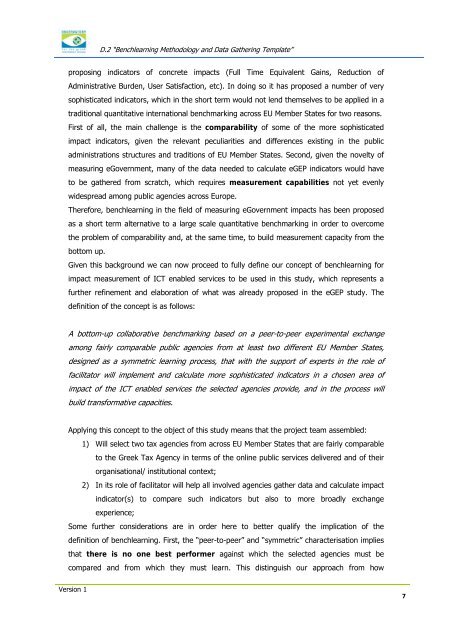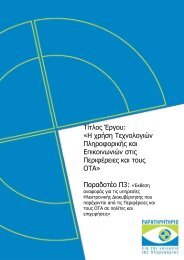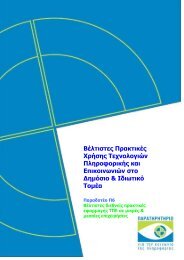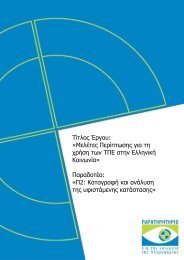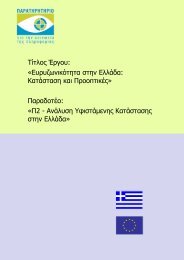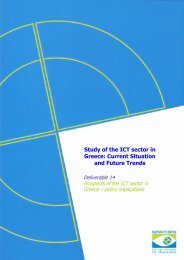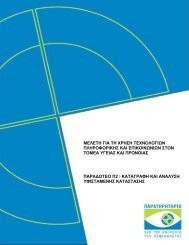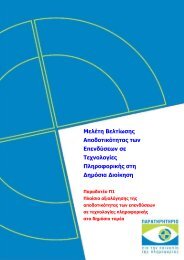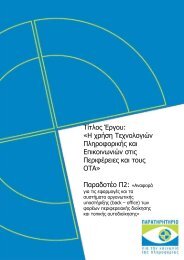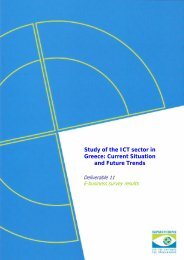Benchlearning methodology and data gathering template
Benchlearning methodology and data gathering template
Benchlearning methodology and data gathering template
- No tags were found...
Create successful ePaper yourself
Turn your PDF publications into a flip-book with our unique Google optimized e-Paper software.
D.2 “<strong>Benchlearning</strong> Methodology <strong>and</strong> Data Gathering Template”proposing indicators of concrete impacts (Full Time Equivalent Gains, Reduction ofAdministrative Burden, User Satisfaction, etc). In doing so it has proposed a number of verysophisticated indicators, which in the short term would not lend themselves to be applied in atraditional quantitative international benchmarking across EU Member States for two reasons.First of all, the main challenge is the comparability of some of the more sophisticatedimpact indicators, given the relevant peculiarities <strong>and</strong> differences existing in the publicadministrations structures <strong>and</strong> traditions of EU Member States. Second, given the novelty ofmeasuring eGovernment, many of the <strong>data</strong> needed to calculate eGEP indicators would haveto be gathered from scratch, which requires measurement capabilities not yet evenlywidespread among public agencies across Europe.Therefore, benchlearning in the field of measuring eGovernment impacts has been proposedas a short term alternative to a large scale quantitative benchmarking in order to overcomethe problem of comparability <strong>and</strong>, at the same time, to build measurement capacity from thebottom up.Given this background we can now proceed to fully define our concept of benchlearning forimpact measurement of ICT enabled services to be used in this study, which represents afurther refinement <strong>and</strong> elaboration of what was already proposed in the eGEP study. Thedefinition of the concept is as follows:A bottom-up collaborative benchmarking based on a peer-to-peer experimental exchangeamong fairly comparable public agencies from at least two different EU Member States,designed as a symmetric learning process, that with the support of experts in the role offacilitator will implement <strong>and</strong> calculate more sophisticated indicators in a chosen area ofimpact of the ICT enabled services the selected agencies provide, <strong>and</strong> in the process willbuild transformative capacities.Applying this concept to the object of this study means that the project team assembled:1) Will select two tax agencies from across EU Member States that are fairly comparableto the Greek Tax Agency in terms of the online public services delivered <strong>and</strong> of theirorganisational/ institutional context;2) In its role of facilitator will help all involved agencies gather <strong>data</strong> <strong>and</strong> calculate impactindicator(s) to compare such indicators but also to more broadly exchangeexperience;Some further considerations are in order here to better qualify the implication of thedefinition of benchlearning. First, the “peer-to-peer” <strong>and</strong> “symmetric” characterisation impliesthat there is no one best performer against which the selected agencies must becompared <strong>and</strong> from which they must learn. This distinguish our approach from howVersion 17


